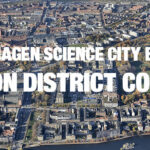Start-up from Copenhagen Science City ecosystem sold in multimillion deal
450 million Euro. (3.39 billion DKK) That will be the final price if pharma start-up Embark Biotech meets all development milestones in a recent deal with Danish pharma giant Novo Nordisk. Embark Biotech is developing an obesity medication that could bring more tailored treatments to different patient profiles. The science as well as the company is a true Copenhagen Science City-success story.
Fundamental research was first step to commercial succes
The research breakthrough came at the University of Copenhagen, Novo Nordisk Foundation Center for Basic Metabolic Research in 2014. A group of researchers led by Zach Gerhart-Hines, Jakob Bondo Hansen and Thue W. Schwartz discovered a compound that dampens appetite, increases calorie burn and raises the body’s sensitivity to insulin. The discovery, however, was only a tiny first step on the road to commercial viability.
The recent sale of Embark Biotech is very concrete evidence, that the innovation ecosystem in Copenhagen Science City works on all levels: From excellent science over very professional business development to high class start-up communities and accelerator programmes. The company never had to leave our innovation district to find it all”: David Dreyer Lassen, Pro-rector for Research and Innovation, University of Copenhagen and Chair of Copenhagen Science City Development Council.
A very patient employer
The Embark-compound was an attractive target as a medication for diabetes as well as obesity. The researchers ensured patent protection of their research results through the university’s Tech Transfer Office (TTO). TTO commercial officers undertook the first evaluations into spin-out pathways on the basis of the patented invention and together with the inventors. The company was subsequently spun out from the university in 2017.
If I had worked anywhere else, I would probably have felt compelled to publish the results of our research much earlier to protect my position and career. This would have limited our ability to mature the results. I am grateful that the university has been patient and supportive. This allowed us to wholeheartedly develop our research results”: Zach Gerhart-Hines, Associate Professor, University of Copenhagen, and CTO, Embark Biotech.
Had to wait for interest from buyers
Obesity was not an indication that captured the interest of investors in 2017. Funding from Innovation Fund Denmark and the Novo Nordisk Foundation tided the young company over until they had matured sufficiently to enter an accelerator programme. They found the right programme in 2021 at BioInnovation Institute.
UCPH spinout was BII’s first sale
BII is an international enterprise foundation located centrally in Copenhagen Science City. It operates an incubator to accelerate world-class life science innovation. Embark went on to become their first sale.
The company had a promising discovery platform but lacked financial support when the field of obesity and cardiometabolic diseases was not as prominent as today. As a non-profit foundation, we can take such risks and support impact-driven science and great teams”: Bobby Soni, CBO, BioInnovation Institute.
Sale starts as co-creation
In August 2023 Embark and BioInnovation Institute announced, that Novo Nordisk had acquired Embark and its lead metabolic program. The start-up and the giant have now entered a three-year research and development collaboration.
Worst case: 15 million Euro. Best? 456 million
Novo Nordisk receives the full rights to develop and commercialize the lead program, while the Embark shareholders will receive 15 million Euro (111 mio DKK) in upfront cash payment and are eligible to receive potential development, regulatory, and commercial milestones of up to 456 million Euro (3,39 billion DKK). This is BioInnovation Institutes’ first exit since they launched their programmes in November 2018.
The value of university research
The current Novo Nordisk blockbuster, Wegovy is another anti-obesity drug, that builds on University of Copenhagen research. Wegovy played a major role, when the value of the pharma company recently shot to 2,806 billion DKK. 79 percent of research in the Novo Nordisk family was co-published with universities between 2018 and 2022. With 659 articles University of Copenhagen published as much as the next three universities taken together.
About Copenhagen Science City
Copenhagen Science City is a two square kilometre innovation district in the heart of the Danish capital. Here, University of Copenhagen, University Hospital Rigshospitalet and University College Copenhagen are working to create optimal conditions for students and researchers dreaming of starting a business, and for companies who need to develop, validate or test their products in collaboration with the knowledge institutions.




